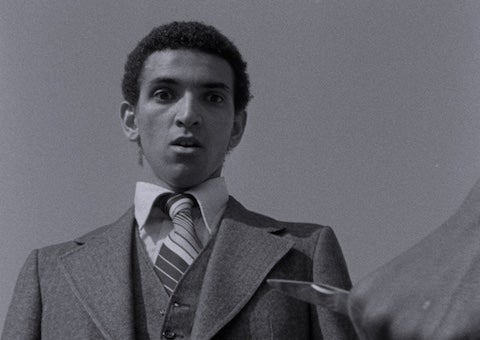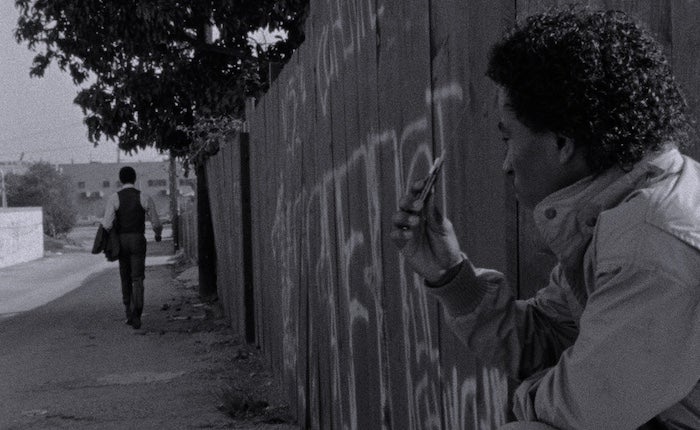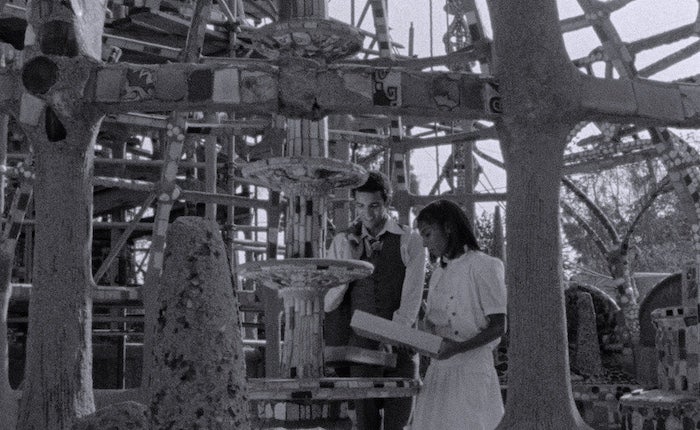
S. Torriano Berry in Rich (1983)
Our guest writer is Gabz Norte, a recent UCLA graduate of the Master of Library and Information Science degree program with a specialization in Media Archival Studies. Norte worked under the supervision of UCLA Film & Television Archive staff to inspect, prepare, digitally restore and preserve the film Rich (1983). This internship was made possible by generous funding from the Myra Reinhard Family Foundation.
The night before his high school graduation, Richard “Rich” Lawson dreams of his late father. His words are clear in Rich’s mind: Your education is very important. It’s something that, once you have it, they can’t take it away. This is a sentiment Rich has carried throughout his life.
S. Torriano Berry, the director, writer, producer, editor, composer and star of Rich, completed the film in 1983 as his 477 Film II class project while a student in UCLA’s Department of Theater Arts. Rich arrived during the second decade of the UCLA student film movement known as the “L.A. Rebellion.” The film fits in with the stylistic and thematic traditions of many of its earlier peers, such as Charles Burnett’s celebrated Killer of Sheep (1977), while remaining unique in purpose and production. The film draws on characteristics of Italian Neorealism — an approach used by many L.A. Rebellion filmmakers — through its location shooting in Watts and, conceptually, its focus on social reality. A component of this is that there is a baseline of survival that is intrinsic to daily life and an emphasis on the experience — often only as spectators — of the youth through these realities. However, unlike the bleak futures portrayed in Italian Neorealist films, Rich is utterly hopeful. It supports a humanistic approach to Black representation, one in which, with the tool of education, a young Black man has active control over his future, and a future that looks bright.

The importance and celebration of education in the face of the challenging circumstances of one’s environment is a theme that extends beyond the narrative walls and translates into the common, ongoing battle experienced many first-generation and historically marginalized students pursuing higher education. There are built-in barriers in these lives and experiences that are often exacerbated by the inner circle, a group one would think would encourage higher aspirations, rather than limit them.

The film’s titular character chooses to pursue a college education rather than take a seemingly dead-end job that his mother wants for him. It’s a belief that many film students are familiar with: the pressure to settle for perceived stability against the passion to pursue something bigger. A college degree in film studies is often seen as a frivolous and risky endeavor, yet the technical, creative and problem-solving skills gained from film school provide more than a surface-level ability to tell a story. The L.A. Rebellion filmmakers themselves are examples of students from diverse communities, often beset by hostile forces, who were persistent and doing the work to get an education that is uniquely theirs.

Previously preserved by the UCLA Film & Television Archive and screened at the Billy Wilder Theater in 2011 as part of the Archive’s L.A. Rebellion: Creating a New Black Cinema series, Rich underwent a more extensive preservation and digital restoration in the summer of 2023. Working with the original A/B rolls, the film elements were inspected, prepared and scanned in-house. After scanning, the film was digitally restored using a DRS Nova by MTI Film, powerful digital tools to clean up damage and debris, frame by frame. Restoration included removing dirt, fibers, scratches, splotches, splice lines and other particles that had accumulated on the film over the past 40 years. Minor reconstruction of torn frames was also completed during this stage. Despite its age, the film remained in relatively good condition. The A/B roll scans were then edited together, according to a picture reference from a previous print, and color-graded in collaboration with filmmaker S. Torriano Berry.

The 2K restoration breathes renewed life into a realistic and confident character study, shot on brilliant black and white 16mm film, about a young man determined to honor his father and do what seems impossible by going to college. Rich is intimate and timeless, carrying its message and traditions far beyond graduation day. It’s a message to all students that once you have it, they can’t take it away.
Watch Rich:
< Back to the Archive Blog






 Mobile Navigation
Mobile Navigation

